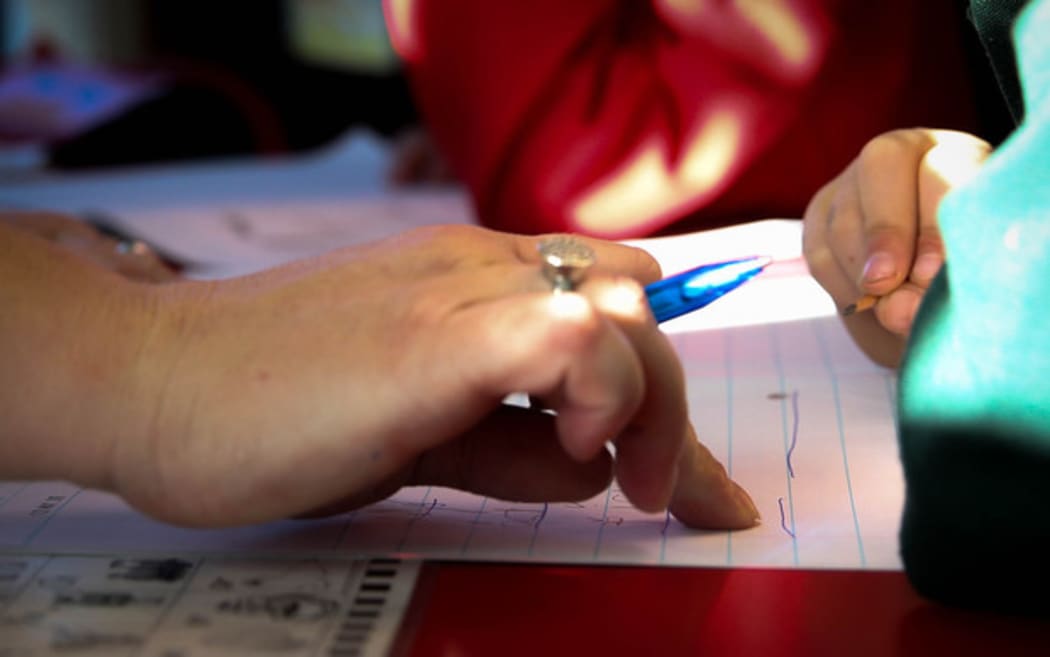Four in five principals around New Zealand will stop asking for donations from parents if a Labour campaign promise goes ahead.

Principals are welcoming the Labour initiative but say it won't be enough. Photo: RNZ / Alexander Robertson
The New Zealand Educational Institute surveyed 622 primary and intermediate school principals and found 82 percent of respondents would take up Labour's campaign pledge for around $150 per student in compensation.
NZEI president Lynda Stuart said schools are very mindful of the mounting costs faced by parents.
"I'm not at all surprised. I'm very very conscious of the amount of money parents are having to pay out just to be in their daily lives with the children. They don't like asking for money."
Ms Stuart said the $150 per student proposed by Labour would see many schools better off. She said it was significant that 41 percent of schools said they would use that money to fund teacher aid, which is normally covered by the operations grant.
"The operations grant has not been enough for the schools to get the teacher aids they need to support children."
"We've been saying for quite some time that the operations grant is nowhere near enough, and I'm not sure it [the $150 per student] will be enough but for some schools it will be significantly more than what they're getting."
"Schools, in the main, try and relate with their parents as well as they possibly can. I think schools do a really good job in most cases of absolutely trying to have the best relationship with most parents. But it's hard asking parents for money when you know they haven't got it."
Mark Potter, principal of Berhampore School, said they currently ask parents for donations that average out to less than $150 per student. Mr Potter said the school is aware of parents having more than one child in the school and will ask less for siblings.
The Labour policy would give Berhampore School $45,000 a year in intake. It currently receives in the mid $20,000s on parent donations.
He said the initiative will make a big difference to the parent community, especially the ones that pay despite financial pressures.
"There's a substantial financial advantage to our school to accept that offer."
But Mr Potter said the money will still not be enough.
"It's time we actually had a really honest look at what resourcing is given to schools across this country."
"We really need to look at what it really costs. I tell you one thing we can't afford is another tax cut when our education system isn't being funded properly."
Wayne Jenkins, principal at Ross Intermediate Palmerston North, said his school changed their donation model to allow parents to choose the amount they're comfortable to pay.
Parents of children at Ross Intermediate can opt out of payments entirely or choose to give up to $500. Mr Jenkins said that parents who could only afford to give $25 would do so and there was no repercussions.
Mr Jenkins said the school would do away with the system if the Labour policy is enacted.
Mr Jenkins said that students at his school were at the age where they better understood their family's financial position and would be reluctant to go home and ask if they could play a sport that year, knowing it would be difficult to stump up the costs.
He said that with the financial barrier removed, students should be able to decide they want to play a sport on their own without worrying about the family's finances.
"Schools shouldn't be finance companies, we shouldn't be spending administration time ringing parents and telling them they owe us money. We should be focusing every single cent we can on improving student learning.
"When we start to become organisations that are billing parents and charging parents and chasing those fees up and sending them off to debt collection agencies, I think we've missed the primary purpose of what schools are here for."

